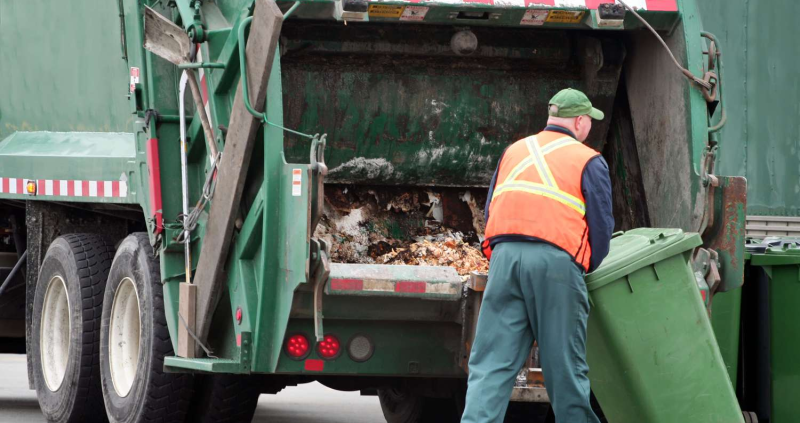The Transportation of Waste Across the USA
The transportation of waste is an essential aspect of managing and maintaining public health and environmental safety in the United States. This comprehensive overview delves into the various aspects of waste transportation, highlighting its significance, regulatory frameworks, transportation methods, challenges, and potential solutions.
Waste transportation plays a critical role in the management of solid waste generated across the United States. From household garbage to hazardous materials, transporting waste is necessary to prevent contamination, reduce environmental impacts, and protect public health. Efficient waste transportation systems ensure that waste is appropriately handled, treated, and disposed of, safeguarding communities and the environment.
Regulatory Framework
Waste transportation in the United States is regulated by federal, state, and local authorities. State and local agencies also have their own requirements to address specific waste management needs. These regulations ensure the safe and lawful transportation of waste, covering areas such as packaging, labeling, manifesting, and training of personnel involved in waste transportation.
Transportation Methods
Various transportation methods are employed for the movement of waste across the country. The most common means of waste transportation include trucks, trains, barges, and pipelines. Trucks are versatile and widely used for both short and long-haul waste transportation, particularly for municipal solid waste and construction debris. Trains and barges offer cost-effective options for transporting large volumes of waste over long distances, especially for interregional or interstate waste movement. Pipelines, though less common, are utilized for the transport of specific waste materials, such as liquids and gases.
Challenges
Despite the crucial role of waste transportation, several challenges exist. One significant obstacle is the potential risk to public safety and the environment due to accidents, spills, or leaks during transportation. Adequate training, strict adherence to regulations, and proper packaging are essential to mitigate these risks. Another challenge is the need for improved infrastructure to support efficient waste transportation systems. Investments in transportation networks, such as roads, railways, and ports, are required to ensure smooth and reliable waste movement.
Additionally, the long distances involved in waste transportation can result in increased fuel consumption and greenhouse gas emissions, contributing to climate change. To address this, promoting sustainable transportation options, such as the use of alternative fuels or electrification, can reduce the environmental footprint associated with waste transportation.
Potential Solutions
To overcome these challenges, it is crucial to prioritize investments in waste management infrastructure, including transportation systems. Enhancing training programs for personnel involved in waste transportation can further improve safety and minimize incidents. Encouraging collaboration between federal, state, and local authorities can help streamline regulatory processes and ensure consistent compliance across jurisdictions. Additionally, incentivizing the development and adoption of sustainable transportation practices can mitigate the environmental impacts of waste transportation.
The transportation of waste across the United States is a multifaceted process that requires careful planning, adherence to regulations, and collaboration between various stakeholders. Efficient waste transportation systems are crucial for protecting public health and the environment. By addressing challenges, promoting sustainable practices, and investing in infrastructure, the nation can enhance waste transportation operations, ensuring the safe and responsible management of waste materials.
Renting a Dumpster for Removing Waste
When faced with a significant amount of waste to dispose of, renting a dumpster can be a practical and efficient solution. Dumpster rentals offer a convenient way to remove large quantities of debris, whether from construction projects, home renovations, or other clean-up activities. This section explores the benefits of renting a dumpster, the considerations to keep in mind, and the steps involved in the process.
One of the primary advantages of renting a dumpster is its convenience. Instead of making multiple trips to a local landfill or waste disposal facility, renting dumpster let you conveniently place the container on-site, allowing you to easily disposal of your waste materials or construction. This saves time, effort, and transportation costs, making it an attractive option for individuals and businesses alike. Moreover, dumpsters are available in various sizes, catering to different project needs, ensuring that you have adequate space to efficiently dispose of the waste generated.
When considering a dumpster rental, there are a few important factors to bear in mind. First, assess the volume and type of waste you will be disposing of to determine the appropriate dumpster size. It is advisable to estimate the amount of waste beforehand, considering factors such as the duration of the project and the types of materials involved. Additionally, check with your local waste management regulations to ensure compliance with any specific requirements or restrictions.
The process of renting a dumpster typically involves a few simple steps. Begin by researching local dumpster rental companies, comparing prices, sizes, and terms of service. Once you have selected a company, contact them to discuss your project requirements, including the desired dumpster size, rental period, and delivery details. The company will schedule the delivery of the dumpster to your location, ensuring it is conveniently placed for easy access. After you have filled the dumpster, arrange for its removal by contacting the rental company, who will then dispose of the waste appropriately, adhering to waste management regulations.
In conclusion, renting a dumpster provides a convenient and efficient solution for waste removal. Whether for residential or commercial projects, dumpsters offer a practical way to handle substantial amounts of debris, eliminating the need for multiple trips to waste disposal facilities. By considering the volume and type of waste, adhering to local regulations, and following the rental process, you can streamline your waste management efforts and ensure a smoother and more effective cleanup experience.
Ressources
- https://wipp.energy.gov/waste-transportation.asp
- https://www.phmsa.dot.gov/transporting-infectious-substances/transporting-infectious-substances-overview
- https://www.road-transport-technology.org/how-to-choose-your-dumpster-size/
- https://dumpsterrentalfortmyers.org/
- https://www.road-transport-technology.org/renting-a-dumpster-in-georgetown-to-make-the-moving-process-easier/



